Ginger tea offers powerful health benefits — from easing nausea and improving digestion to strengthening your heart and immune system.
Backed by both ancient wisdom and modern science, this warm, caffeine-free beverage made from Zingiber officinale is one of nature’s most effective remedies for everyday wellness.
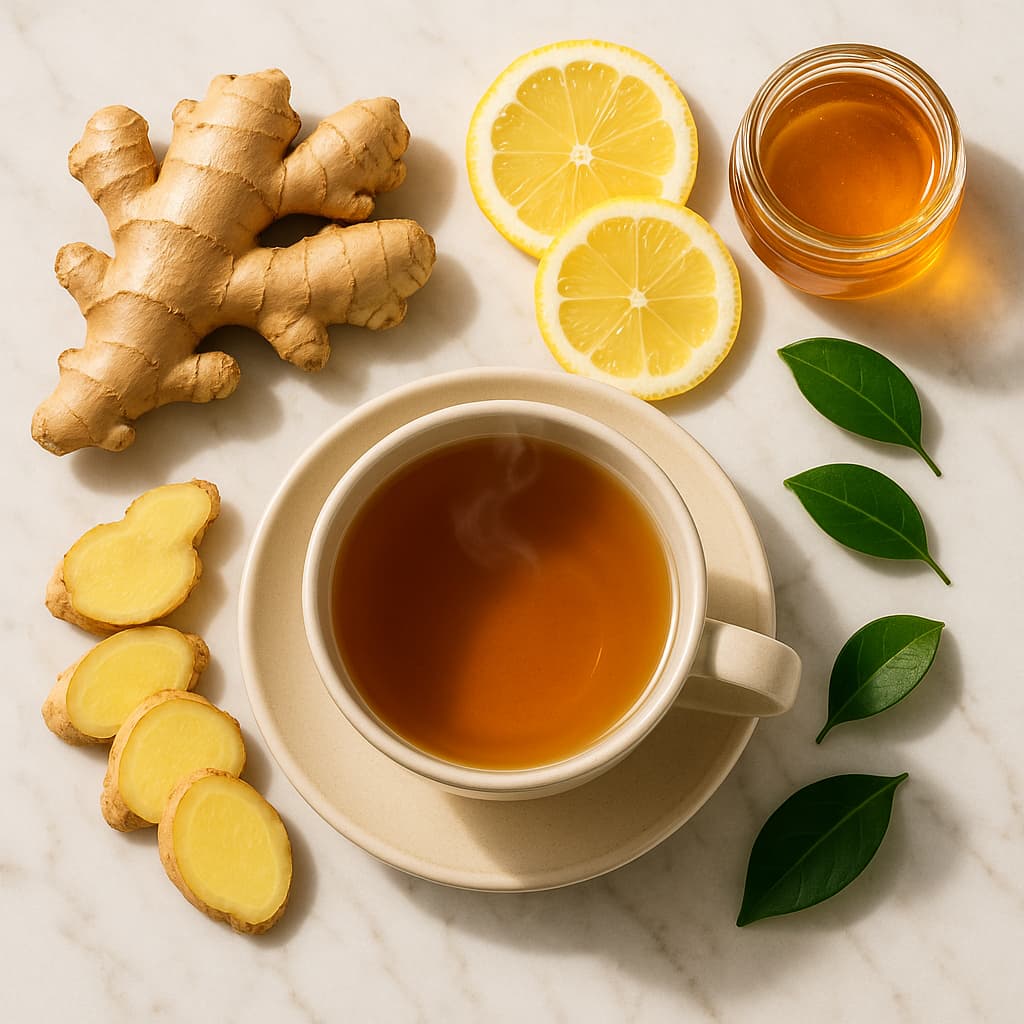
Ginger’s active compounds — gingerols, shogaols, and zingerone — are known for their anti-inflammatory, antioxidant, and digestive-supporting properties.
According to the Cleveland Clinic, regular ginger consumption may help reduce inflammation, balance cholesterol and blood sugar, and even enhance immune defense.
Understanding how ginger tea benefits your body helps you use it safely and effectively.
In this guide, you’ll discover 10 science-backed health benefits of ginger tea, along with preparation tips, dosage guidelines, safety precautions, and expert answers to common questions — all based on the latest research from trusted health sources like NIH, Johns Hopkins Medicine, and Verywell Health.
🌿 Whether you’re looking to improve digestion, manage inflammation, or simply enjoy a daily wellness ritual, ginger tea is a natural, delicious way to support your overall health.
What Is Ginger Tea?

Ginger tea is a caffeine-free herbal infusion made from the root of the plant Zingiber officinale, widely known for its spicy aroma and medicinal power.
It’s one of the world’s oldest natural remedies, used for centuries in Ayurvedic, Chinese, and Middle Eastern medicine to treat nausea, colds, and inflammation.
Key Compounds
Ginger’s healing strength comes from its bioactive compounds, especially gingerols, shogaols, and zingerone.
- Gingerols – the main active compounds in fresh ginger; powerful antioxidants and anti-inflammatory agents.
- Shogaols – formed when ginger is dried or heated; responsible for its strong flavor and enhanced medicinal potency.
- Zingerone – produced during heating; known for soothing the stomach and improving circulation.
According to the National Institutes of Health (NIH), these compounds help fight oxidative stress, reduce inflammation, and support overall metabolic health.
☕ How It’s Made
Making ginger tea is simple:
- Slice or grate fresh ginger root (about 1–2 teaspoons).
- Boil in 1 cup of water for 5–10 minutes.
- Strain, then add lemon or honey if desired.
For convenience, you can also use dried ginger powder or ginger tea bags, which still deliver the same key plant compounds, though with slightly reduced potency.
🌱 Why It Matters
Because it’s naturally caffeine-free, ginger tea can be enjoyed any time of day. It’s a warming, soothing beverage that supports digestion, immunity, and heart health — all backed by emerging modern research.
The Johns Hopkins Medicine notes that even a small daily serving of ginger can contribute to better immune defense and gut function.
Why Ginger Tea Matters for Your Health
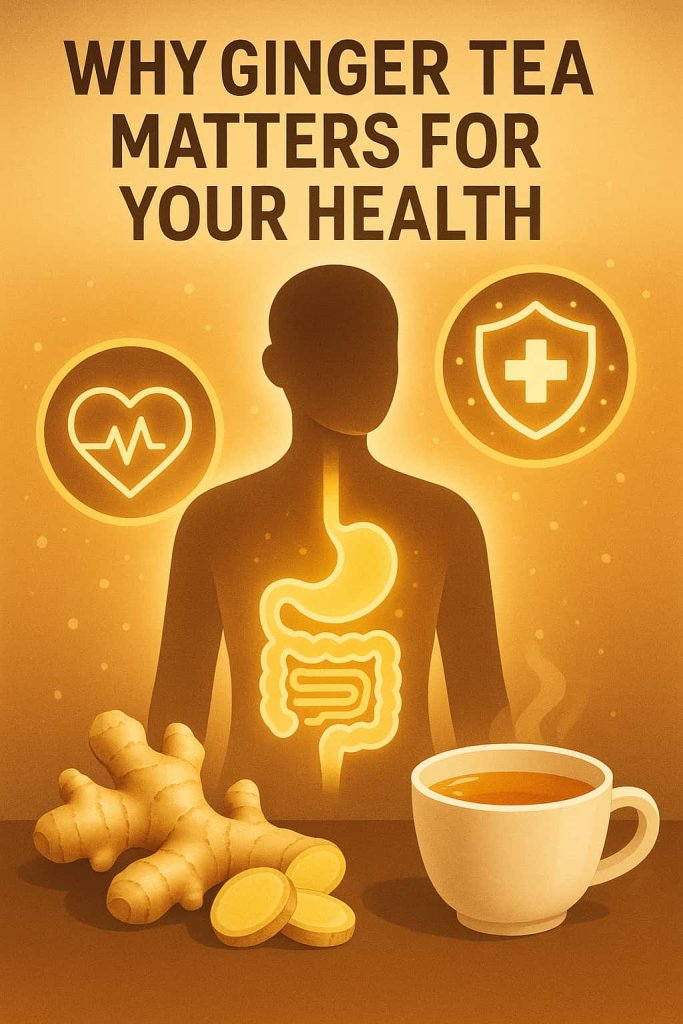
Ginger tea matters for your health because it supports nearly every major system in your body — from digestion and immunity to heart health and metabolism.
It’s more than a soothing drink; it’s a functional wellness beverage backed by centuries of traditional use and growing scientific research.
A Natural Remedy with Proven Science
Modern studies confirm what ancient medicine long believed: ginger’s active compounds, such as gingerols and shogaols, have strong anti-inflammatory, antioxidant, and antimicrobial properties.
According to the Cleveland Clinic, these compounds help the body fight inflammation, improve circulation, and strengthen immune response.
This makes ginger tea a gentle, natural way to enhance well-being — without caffeine or artificial additives.
🍽️ Supports Digestive Harmony
The National Institutes of Health (NIH) explains that ginger helps regulate gastric movement, making it highly effective for easing indigestion, nausea, and bloating.
A warm cup after meals promotes faster stomach emptying and reduces discomfort — one of the reasons it’s been used in traditional remedies for centuries.
🛡️ Strengthens Immune Defense
Rich in antioxidants and anti-inflammatory compounds, ginger tea helps neutralize free radicals that weaken immune cells.
As noted by Johns Hopkins Medicine, drinking ginger tea regularly may support your body’s natural defense against infections, especially during seasonal changes.
❤️ Promotes Heart and Metabolic Health
Emerging evidence suggests that ginger tea supports a healthy heart and metabolism by improving cholesterol balance and glucose regulation.
Studies published in PubMed Central report that consistent ginger intake may lower LDL (bad) cholesterol and fasting blood sugar, two key risk factors for cardiovascular disease and diabetes.
☕ Simple, Affordable, and Safe
One of the greatest advantages of ginger tea is its accessibility — it’s inexpensive, widely available, and easy to prepare at home.
Because it’s naturally caffeine-free, you can enjoy it daily as part of your wellness routine, whether to soothe digestion, warm up on a cold day, or naturally boost your energy levels.
In short: Ginger tea is a simple daily habit with wide-reaching benefits — a natural way to care for your digestion, immunity, heart, and overall vitality.
10 Science-Backed Benefits of Ginger Tea
Discover how a simple cup of ginger tea can deliver a wide range of evidence-backed health benefits — from calming your stomach to strengthening your heart and immune system. Modern research continues to validate this ancient remedy’s healing potential.
1. Relieves Nausea and Motion Sickness

Ginger tea is one of the most trusted natural remedies for nausea and vomiting, especially in cases of pregnancy-related morning sickness, chemotherapy, and motion sickness.
A 2022 meta-analysis published on PubMed Central found that ginger supplementation significantly reduced nausea intensity compared to placebo.
How it works:
The active compounds gingerols and shogaols interact with serotonin receptors in the gut and brain, calming the digestive system and reducing signals that trigger nausea.
🔹 Tip: Sip a cup of ginger tea before traveling or during early pregnancy to ease motion sickness — but always consult your doctor first.
2. Improves Digestion and Reduces Bloating
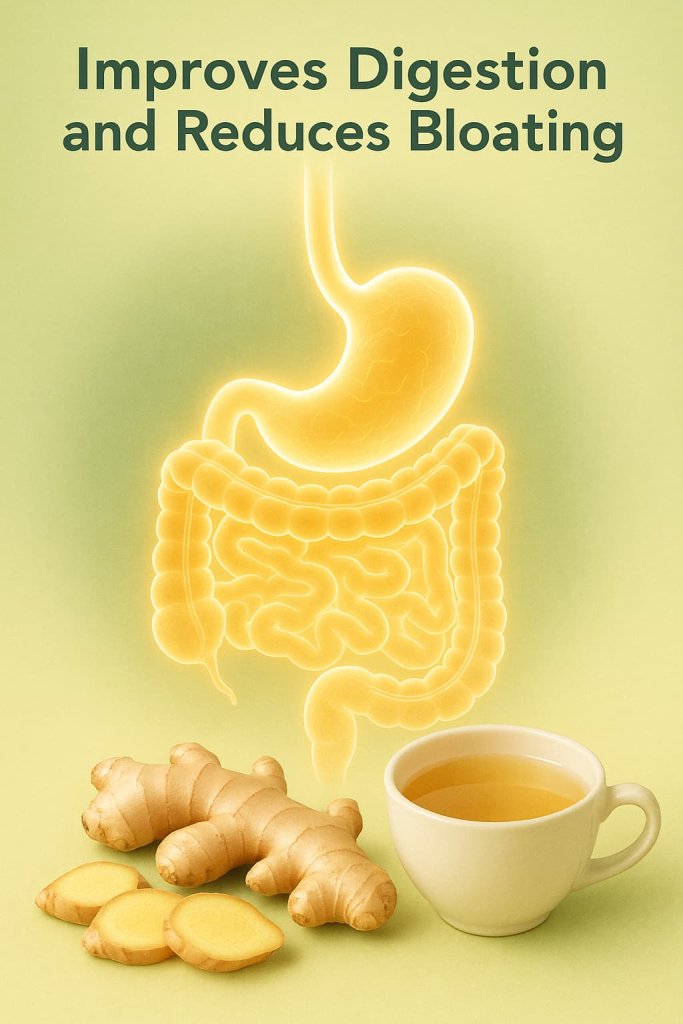
If you suffer from indigestion, bloating, or gas, ginger tea can bring relief naturally.
A 2025 review in ScienceDirect found that ginger accelerates gastric emptying and improves overall digestive motility.
Ginger tea stimulates digestive enzymes, helps food move smoothly through your stomach, and prevents the buildup of gas that causes discomfort.
🔹 Tip: Drink one cup of ginger tea 20 minutes after a meal to promote digestion and reduce bloating.
3. Fights Inflammation Naturally

Chronic inflammation contributes to diseases like arthritis, heart disease, and diabetes.
According to the National Institutes of Health (NIH), ginger contains potent anti-inflammatory compounds — gingerols and shogaols — which help reduce markers such as C-reactive protein (CRP) and TNF-α.
This makes ginger tea a gentle, natural alternative for people seeking relief from joint pain, muscle soreness, or inflammatory conditions.
🔹 Tip: Consistent intake of ginger tea can support mobility and comfort in those with arthritis or post-exercise stiffness.
4. Boosts Immunity
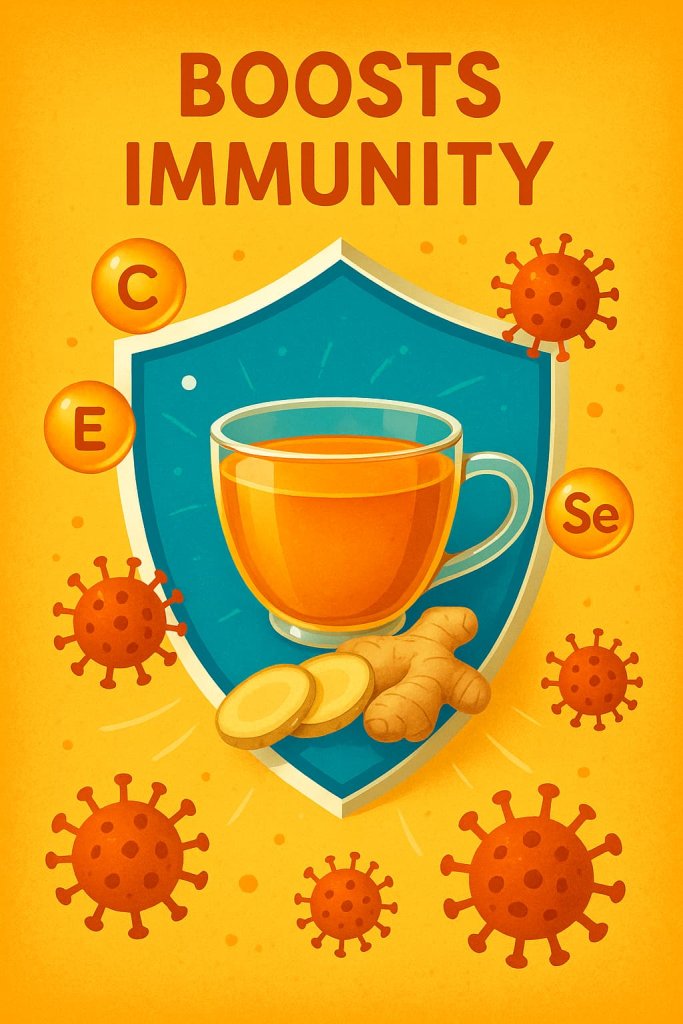
A strong immune system is your first defense against infections — and ginger tea helps build it naturally.
According to Johns Hopkins Medicine, ginger tea boosts immune response and helps your body fight bacteria and viruses through its high antioxidant and antimicrobial properties.
These antioxidants neutralize harmful free radicals that can damage immune cells, while ginger’s warming effect enhances circulation, improving nutrient delivery throughout the body.
🔹 Tip: For an immune boost, mix ginger tea with fresh lemon juice and honey — a time-tested natural cold remedy.
5. Supports Heart Health

Drinking ginger tea regularly may promote cardiovascular wellness by supporting healthy cholesterol and blood pressure levels.
A 2024 report from the Cleveland Clinic highlights that 3 g of ginger per day can help reduce LDL (“bad”) cholesterol, lower triglycerides, and improve blood flow.
Ginger’s anti-inflammatory and antiplatelet properties may also reduce the risk of atherosclerosis and blood clots, which are major contributors to heart disease.
🔹 Tip: Combine ginger tea with heart-friendly foods like oats and nuts to enhance protective effects.
6. Helps Regulate Blood Sugar
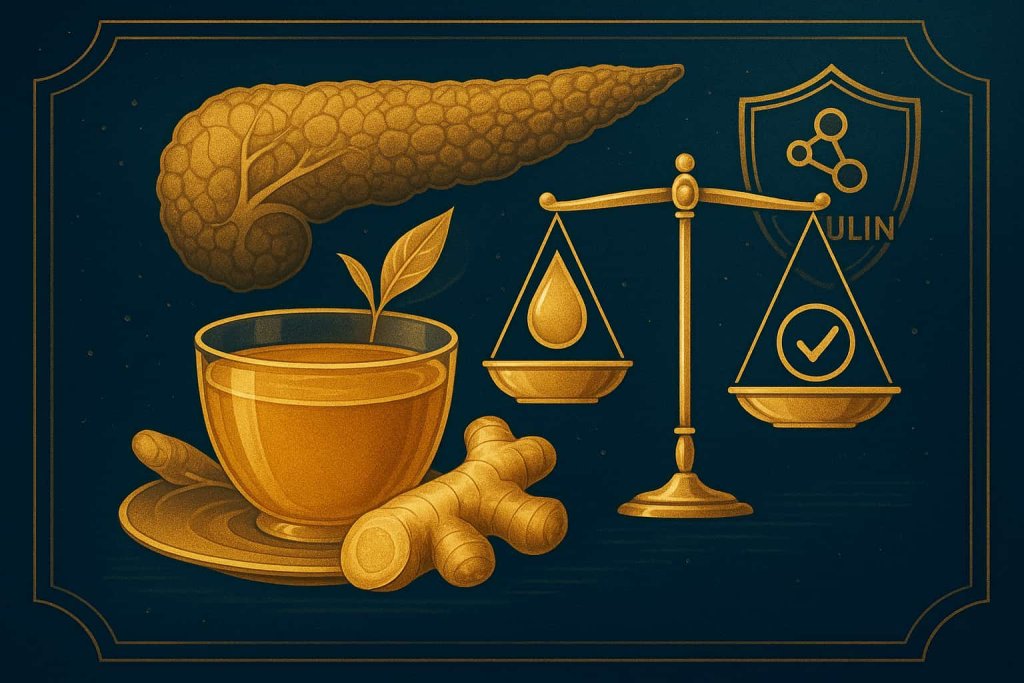
For individuals managing type 2 diabetes, ginger tea offers promising benefits.
A 2023 study from UCLA Health found that gingerol, a major bioactive compound in ginger, improves insulin sensitivity and helps glucose enter cells more efficiently.
Regular consumption may help stabilize fasting blood sugar levels and reduce insulin resistance — though it should not replace prescribed medication.
🔹 Tip: Drink unsweetened ginger tea between meals to support steady blood sugar and curb cravings.
7. Eases Menstrual Cramps

Ginger tea is a gentle and effective natural treatment for menstrual pain.
Clinical trials summarized by Verywell Health found that ginger can reduce period pain as effectively as ibuprofen or mefenamic acid, without the side effects of synthetic painkillers.
Its anti-inflammatory effects help relax uterine muscles, improving blood flow and reducing prostaglandin production — the hormones responsible for cramping.
🔹 Tip: Drink 2–3 cups of warm ginger tea daily during your period for noticeable relief.
8. Soothes Sore Throat and Cold Symptoms

Ginger tea is a comforting home remedy for sore throat, cough, and nasal congestion.
The Mayo Clinic notes that ginger’s natural antibacterial and antiviral properties may help the body fight infections and soothe irritation.
The warmth of the tea increases blood circulation and loosens mucus, while honey (if added) enhances its antibacterial effect.
🔹 Tip: Add honey and lemon to ginger tea to calm the throat and boost recovery during colds or flu.
9. Aids Weight Management

Trying to manage your weight naturally? Ginger tea can help.
According to a 2023 PubMed Central review, ginger promotes thermogenesis (heat production that burns calories) and may suppress appetite.
It also helps regulate metabolism and improve fat digestion, making it a supportive beverage for healthy weight loss plans.
🔹 Tip: Drink a cup of ginger tea 30 minutes before meals to enhance satiety and curb overeating.
10. May Protect Against Chronic Diseases
Ginger’s powerful antioxidants may help protect cells from oxidative damage that leads to aging and chronic diseases like cancer, Alzheimer’s, and heart disease.
WebMD (2024) reports that ginger compounds such as zingerone and paradol can help inhibit DNA damage and cell mutations.
Although human research is still limited, early studies suggest regular consumption of ginger tea may support long-term cellular health and reduce inflammation-related risks.
🔹 Tip: Make ginger tea part of your daily wellness ritual for long-term disease prevention and vitality.
Recommended Dosage, Safety & Precautions
Ginger tea is generally safe for most adults when consumed in moderation, but dosage, medical conditions, and medication interactions should always be considered.
According to the National Institutes of Health (NIH), ginger is recognized as “Generally Regarded as Safe (GRAS)” by the U.S. Food and Drug Administration (FDA) when used as a food or tea.
However, higher doses or concentrated extracts can cause side effects or interact with certain medicines.
🫖 Recommended Daily Dosage
| Purpose | Recommended Amount | Form / Notes |
|---|---|---|
| General wellness | 1–2 cups per day | Brew with fresh ginger slices (2–4 g root) or 1 tea bag |
| Digestive support / nausea relief | Up to 3 cups daily | Use fresh ginger for maximum potency |
| Anti-inflammatory benefits | 2–4 g dried ginger or equivalent tea | Divide into 2–3 servings |
| Menstrual or joint pain relief | 2–3 cups/day during symptom days | Safe for short-term use |
| Pregnancy-related nausea | Limit to 1 cup/day | Only under medical supervision |
(Sources: NIH, Cleveland Clinic, Verywell Health)
⚠️ Who Should Be Cautious or Avoid Ginger Tea
While ginger tea is safe for most, certain groups should drink it carefully or avoid it altogether:
👩⚕️ Pregnant or Breastfeeding Women
- Small amounts (under 1 g/day) may help morning sickness, but excess can increase uterine activity.
- Always consult your healthcare provider before regular use.
(Source: Mayo Clinic)
💊 People Taking Medications
Ginger can interact with specific medications, including:
- Blood thinners (e.g., warfarin, aspirin) → may increase bleeding risk.
- Diabetes medications → may enhance blood sugar–lowering effects.
- Blood pressure medications → may cause additive blood pressure reduction.
(Source: WebMD)
❤️ Individuals with Heartburn, GERD, or Ulcers
- Large doses may aggravate heartburn or acid reflux.
- Use mild infusions or reduce frequency if irritation occurs.
🩸 Pre-Surgery Precaution
- Ginger can thin the blood; stop drinking it at least one week before surgery to prevent bleeding complications.
(Source: NIH Office of Dietary Supplements)
🚫 Possible Side Effects (Rare but Possible)
When consumed in excess (over 4 g/day), some people may experience:
- Mild heartburn or stomach upset
- Mouth or throat irritation
- Gas or bloating
- Increased menstrual flow
If these symptoms occur, reduce intake or consult a doctor.
✅ Safe Consumption Tips
- Stick to 1–3 cups per day for best results.
- Avoid concentrated ginger shots or extract supplements unless prescribed.
- Brew with fresh, thinly sliced ginger root for the most balanced and gentle infusion.
- Always check with your healthcare provider if you have chronic illness or take medications.
Bottom line: Ginger tea is safe, natural, and beneficial when consumed moderately — but like any herb, it should be used responsibly, especially if you have underlying health conditions.
Frequently Asked Questions (FAQ)
1. Can I drink ginger tea every day?
Yes — most adults can safely drink 1–3 cups of ginger tea daily.
Regular use supports digestion, immunity, and circulation, but excessive amounts (over 4 g of dried ginger per day) may cause mild side effects like heartburn.
The Cleveland Clinic confirms that moderate daily intake is beneficial for general wellness.
Is ginger tea good for weight loss?
Yes. Ginger tea may aid weight management by improving fat metabolism and reducing appetite.
A 2023 review on PubMed Central found that ginger helps increase thermogenesis (the body’s fat-burning process) and enhances calorie expenditure.
For best results, combine it with a balanced diet and regular exercise.
3. Does ginger tea have caffeine?
No — ginger tea is naturally caffeine-free, making it a great option for people sensitive to stimulants.
It can be enjoyed morning or night without affecting sleep, unlike black or green tea.
This makes it ideal for daily hydration and relaxation, especially before bedtime.
4. Can pregnant women drink ginger tea?
In small amounts, yes.
Studies published by the National Institutes of Health (NIH) show that low-dose ginger (under 1 g/day) may safely reduce morning sickness and nausea in early pregnancy.
However, large quantities could increase uterine activity, so always consult your doctor before using ginger tea during pregnancy.
5. When is the best time to drink ginger tea?
- Morning: To jump-start metabolism and energy naturally.
- After meals: To aid digestion and prevent bloating.
- Evening: For relaxation and soothing the stomach before bed.
The Johns Hopkins Medicine notes that timing depends on your goals — digestion, immunity, or general comfort.
6. Can ginger tea help with colds and sore throats?
Yes — ginger’s natural antibacterial and antiviral properties can ease cold and flu symptoms.
A Mayo Clinic overview confirms that it can relieve sore throat, reduce inflammation, and improve mucus clearance.
Adding honey or lemon enhances its antimicrobial and soothing effects.
7. Who should avoid ginger tea?
People taking blood thinners, blood pressure, or diabetes medications should be cautious, as ginger may amplify their effects.
Those with acid reflux (GERD) or scheduled for surgery should also limit intake.
For individualized advice, consult your healthcare provider or review WebMD’s safety guidance.
💡 Quick Takeaway:
Ginger tea is safe, versatile, and beneficial when enjoyed in moderation. Knowing when and how to drink it — and who should be cautious — ensures you get all its health benefits safely and effectively.
Conclusion
Ginger tea is far more than a comforting warm drink — it’s a proven natural ally for your digestion, heart, immunity, and overall vitality.
Modern science confirms what ancient medicine has practiced for centuries: the active compounds in ginger, including gingerols and shogaols, support the body’s natural ability to heal, fight inflammation, and stay balanced.
Regularly enjoying 1–2 cups of ginger tea per day can:
- Ease bloating, nausea, and motion sickness
- Strengthen your immune system
- Support healthy cholesterol and blood sugar levels
- Soothe menstrual or joint discomfort
- Promote long-term wellness and disease prevention
Because it’s caffeine-free, natural, and easy to prepare, ginger tea fits effortlessly into any lifestyle — whether you drink it in the morning to boost energy or at night to calm digestion.
🌿 Start your wellness ritual today:
Brew a fresh cup of ginger tea, breathe in its warming aroma, and let every sip remind you that simple, natural habits can make the biggest difference in your health.
Consistency is key — one cup a day can bring lasting benefits for your body, mind, and immune system.
Research References
- Cleveland Clinic (2024) — “The Health Benefits of Ginger.”
Comprehensive clinical overview explaining how ginger supports digestion, reduces inflammation, and promotes heart health.
👉 https://health.clevelandclinic.org/ginger-health-benefits
- Johns Hopkins Medicine (2024) — “Ginger Benefits.”
Authoritative guide highlighting ginger’s antioxidant, anti-nausea, and immune-supporting effects.
👉 https://www.hopkinsmedicine.org/health/wellness-and-prevention/ginger-benefits
- National Institutes of Health (NIH) — “The Amazing and Mighty Ginger.”
Extensive scientific review detailing ginger’s bioactive compounds (gingerols, shogaols) and their roles in anti-inflammatory, antioxidant, and digestive health.
👉 https://www.ncbi.nlm.nih.gov/books/NBK92775/
- PubMed Central (2022) — “The Effectiveness of Ginger in the Treatment of Nausea and Vomiting.”
Meta-analysis confirming that ginger significantly reduces nausea in pregnancy, chemotherapy, and postoperative patients.
👉 https://pmc.ncbi.nlm.nih.gov/articles/PMC4818021/
- Verywell Health (2025) — “Ginger Tea Benefits.”
Up-to-date, research-backed article covering the digestive, anti-inflammatory, and immune benefits of ginger tea, plus dosage guidance.
👉 https://www.verywellhealth.com/ginger-tea-benefits-11767810
